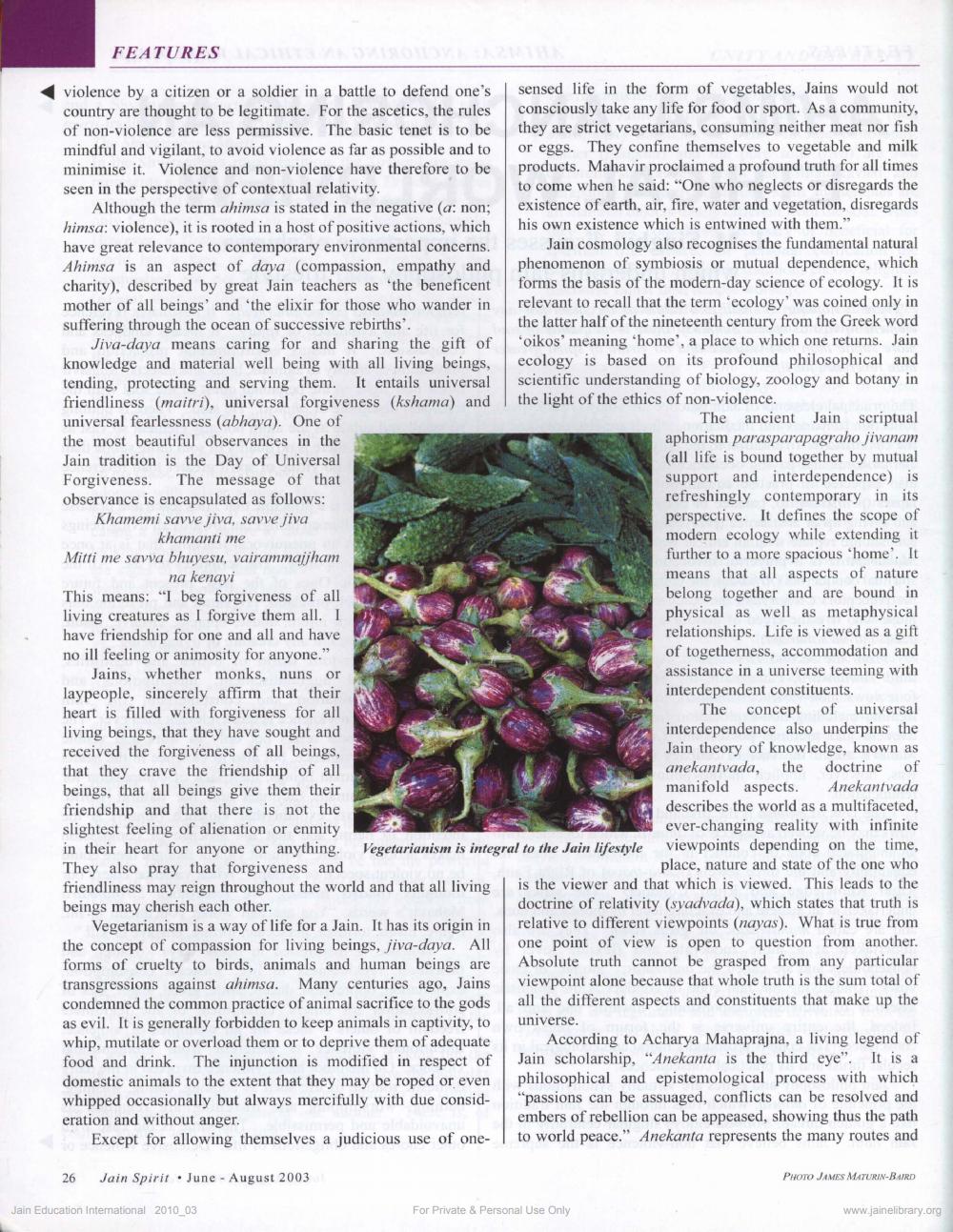________________
FEATURES
violence by a citizen or a soldier in a battle to defend one's sensed life in the form of vegetables, Jains would not country are thought to be legitimate. For the ascetics, the rules consciously take any life for food or sport. As a community, of non-violence are less permissive. The basic tenet is to be they are strict vegetarians, consuming neither meat nor fish mindful and vigilant, to avoid violence as far as possible and to or eggs. They confine themselves to vegetable and milk minimise it. Violence and non-violence have therefore to be products. Mahavir proclaimed a profound truth for all times seen in the perspective of contextual relativity,
to come when he said: "One who neglects or disregards the Although the term ahimsa is stated in the negative (a: non; existence of earth, air, fire, water and vegetation, disregards himsa: violence), it is rooted in a host of positive actions, which his own existence which is entwined with them." have great relevance to contemporary environmental concerns. Jain cosmology also recognises the fundamental natural Ahimsa is an aspect of daya (compassion, empathy and phenomenon of symbiosis or mutual dependence, which charity), described by great Jain teachers as 'the beneficent forms the basis of the modern-day science of ecology. It is mother of all beings' and 'the elixir for those who wander in relevant to recall that the term 'ecology' was coined only in suffering through the ocean of successive rebirths'.
the latter half of the nineteenth century from the Greek word Jiva-daya means caring for and sharing the gift of 'oikos' meaning 'home', a place to which one returns. Jain knowledge and material well being with all living beings, ecology is based on its profound philosophical and tending, protecting and serving them. It entails universal scientific understanding of biology, zoology and botany in friendliness (maitri), universal forgiveness (kshama) and the light of the ethics of non-violence. universal fearlessness (abhaya). One of
The ancient Jain scriptual the most beautiful observances in the
aphorism parasparapagraho jivanam Jain tradition is the Day of Universal
(all life is bound together by mutual Forgiveness. The message of that
support and interdependence) is observance is encapsulated as follows:
refreshingly contemporary in its Khamemi savve jiva, savie jiva
perspective. It defines the scope of khamanti me
modern ecology while extending it Mitti me savva bhuyesu, vairammajjham
further to a more spacious 'home'. It na kenayi
means that all aspects of nature This means: "I beg forgiveness of all
belong together and are bound in living creatures as I forgive them all. I
physical as well as metaphysical have friendship for one and all and have
relationships. Life is viewed as a gift no ill feeling or animosity for anyone."
of togetherness, accommodation and Jains, whether monks, nuns or
assistance in a universe teeming with laypeople, sincerely affirm that their
interdependent constituents. heart is filled with forgiveness for all
The concept of universal living beings, that they have sought and
interdependence also underpins the received the forgiveness of all beings,
Jain theory of knowledge, known as that they crave the friendship of all
anekantvada, the doctrine of beings, that all beings give them their
manifold aspects. Anekantvada friendship and that there is not the
describes the world as a multifaceted, slightest feeling of alienation or enmity
ever-changing reality with infinite in their heart for anyone or anything. Vegetarianism is integral to the Jain lifestyle viewpoints depending on the time, They also pray that forgiveness and
place, nature and state of the one who friendliness may reign throughout the world and that all living is the viewer and that which is viewed. This leads to the beings may cherish each other.
doctrine of relativity (syadvada), which states that truth is Vegetarianism is a way of life for a Jain. It has its origin in relative to different viewpoints (nayas). What is true from the concept of compassion for living beings, jiva-dava. All one point of view is open to question from another. forms of cruelty to birds, animals and human beings are Absolute truth cannot be grasped from any particular transgressions against ahimsa. Many centuries ago, Jains viewpoint alone because that whole truth is the sum total of condemned the common practice of animal sacrifice to the gods all the different aspects and constituents that make up the as evil. It is generally forbidden to keep animals in captivity, to universe. whip, mutilate or overload them or to deprive them of adequate According to Acharya Mahaprajna, a living legend of food and drink. The injunction is modified in respect of Jain scholarship, "Anekanta is the third eye". It is a domestic animals to the extent that they may be roped or even philosophical and epistemological process with which whipped occasionally but always mercifully with due consid
"passions can be assuaged, conflicts can be resolved and eration and without anger.
embers of rebellion can be appeased, showing thus the path Except for allowing themselves a judicious use of one- to world peace." Anekanta represents the many routes and
26
Jain Spirit
June - August 2003
PHOTO JAMES MATURIN-BIRD
Jain Education Interational 2010_03
For Private & Personal Use Only
www.jainelibrary.org




